Ethical Dilemmas at Uber: Management, Leadership, and Solutions
VerifiedAdded on 2020/03/16
|13
|4133
|610
Essay
AI Summary
This essay analyzes the ethical dilemmas faced by Uber, focusing on issues such as sexual harassment and the treatment of drivers as contractors. It explores the application of ethical theories like virtue ethics and rights theory to address these challenges. The essay examines the role of management and leadership in decision-making, highlighting the importance of fair treatment, employee rights, and ethical conduct within the organization. It discusses how Uber's management practices have led to ethical breaches and suggests how the company can improve its ethical framework. The essay emphasizes the interconnectedness of management decisions, leadership qualities, and the overall work environment, advocating for a culture that prioritizes employee well-being and ethical behavior to achieve sustainable business success.
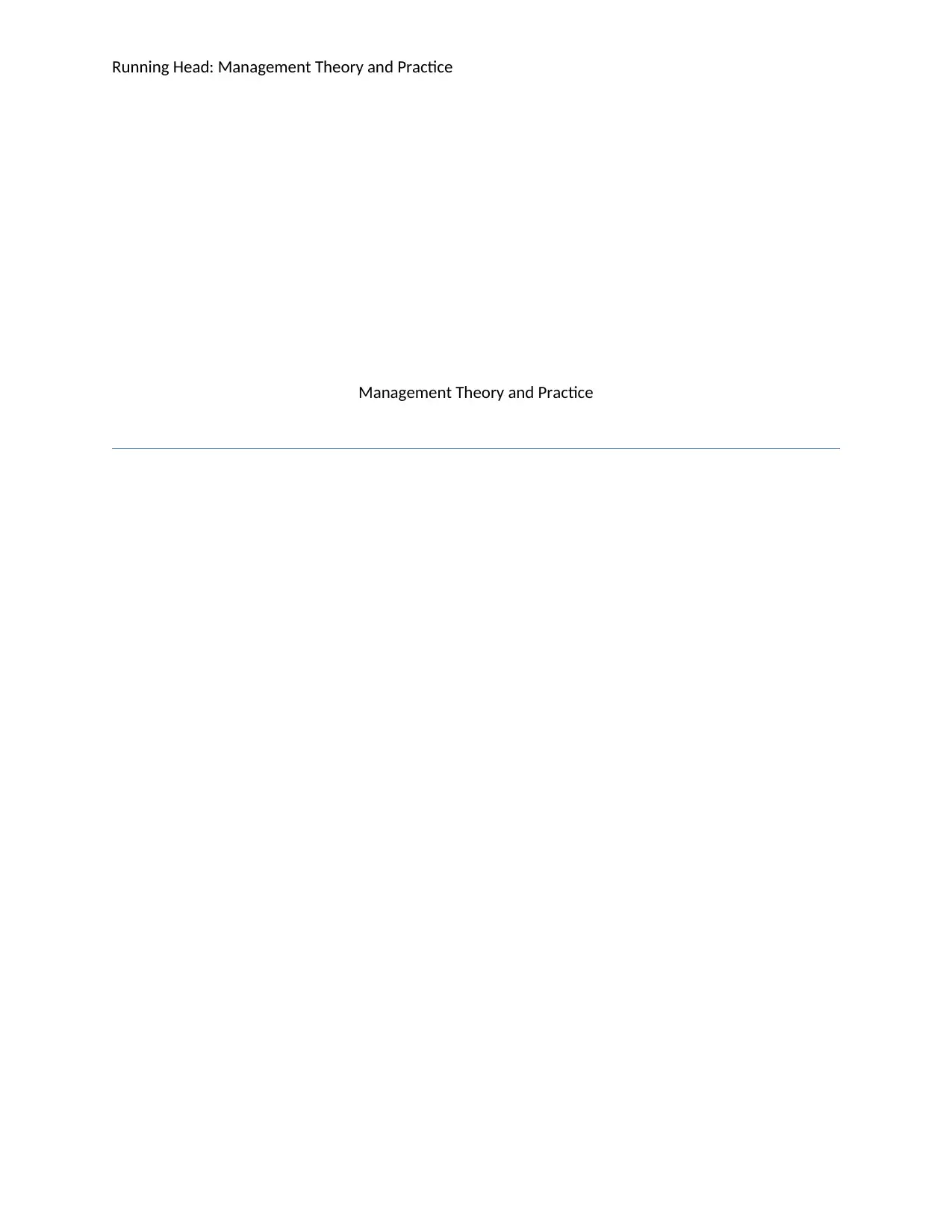
Running Head: Management Theory and Practice
Management Theory and Practice
Management Theory and Practice
Paraphrase This Document
Need a fresh take? Get an instant paraphrase of this document with our AI Paraphraser
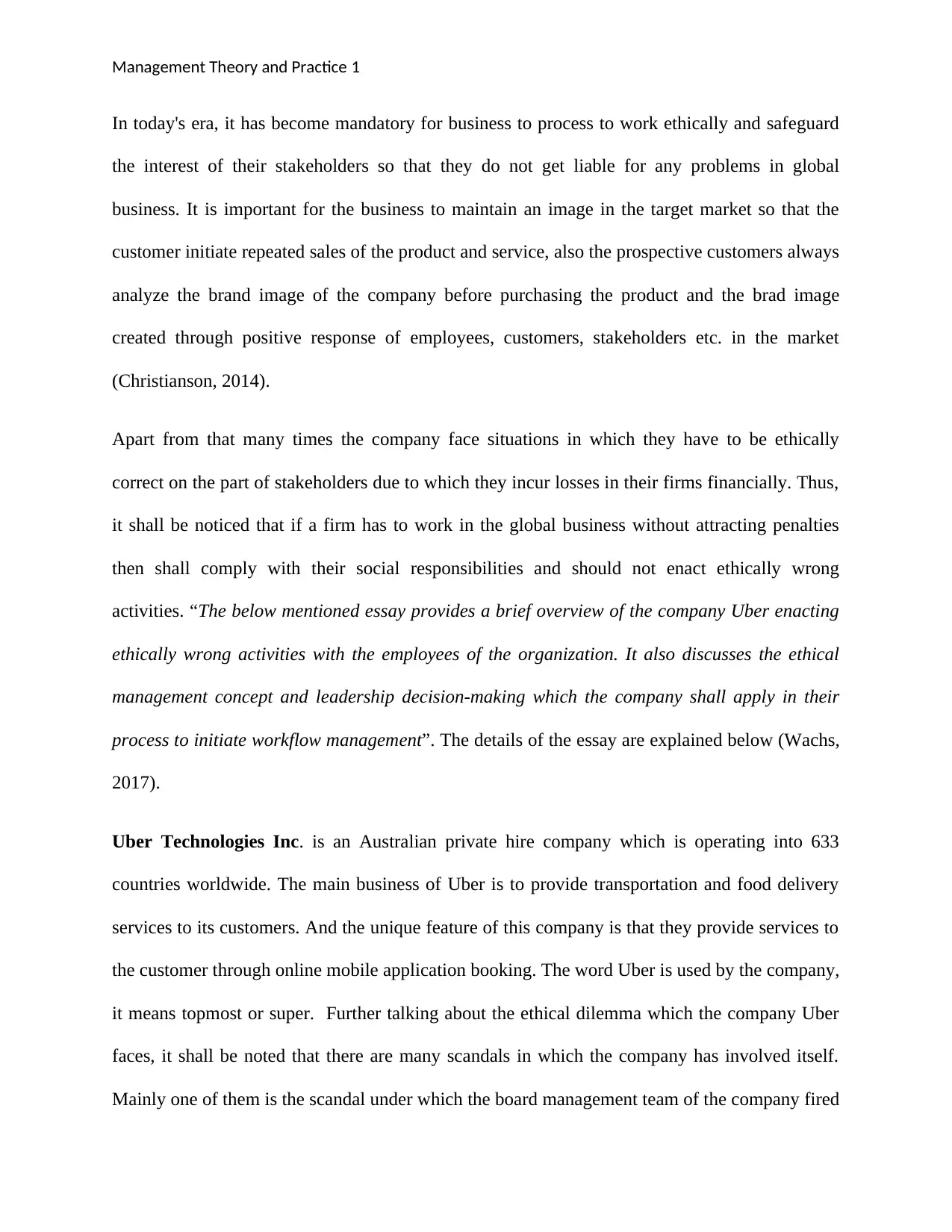
Management Theory and Practice 1
In today's era, it has become mandatory for business to process to work ethically and safeguard
the interest of their stakeholders so that they do not get liable for any problems in global
business. It is important for the business to maintain an image in the target market so that the
customer initiate repeated sales of the product and service, also the prospective customers always
analyze the brand image of the company before purchasing the product and the brad image
created through positive response of employees, customers, stakeholders etc. in the market
(Christianson, 2014).
Apart from that many times the company face situations in which they have to be ethically
correct on the part of stakeholders due to which they incur losses in their firms financially. Thus,
it shall be noticed that if a firm has to work in the global business without attracting penalties
then shall comply with their social responsibilities and should not enact ethically wrong
activities. “The below mentioned essay provides a brief overview of the company Uber enacting
ethically wrong activities with the employees of the organization. It also discusses the ethical
management concept and leadership decision-making which the company shall apply in their
process to initiate workflow management”. The details of the essay are explained below (Wachs,
2017).
Uber Technologies Inc. is an Australian private hire company which is operating into 633
countries worldwide. The main business of Uber is to provide transportation and food delivery
services to its customers. And the unique feature of this company is that they provide services to
the customer through online mobile application booking. The word Uber is used by the company,
it means topmost or super. Further talking about the ethical dilemma which the company Uber
faces, it shall be noted that there are many scandals in which the company has involved itself.
Mainly one of them is the scandal under which the board management team of the company fired
In today's era, it has become mandatory for business to process to work ethically and safeguard
the interest of their stakeholders so that they do not get liable for any problems in global
business. It is important for the business to maintain an image in the target market so that the
customer initiate repeated sales of the product and service, also the prospective customers always
analyze the brand image of the company before purchasing the product and the brad image
created through positive response of employees, customers, stakeholders etc. in the market
(Christianson, 2014).
Apart from that many times the company face situations in which they have to be ethically
correct on the part of stakeholders due to which they incur losses in their firms financially. Thus,
it shall be noticed that if a firm has to work in the global business without attracting penalties
then shall comply with their social responsibilities and should not enact ethically wrong
activities. “The below mentioned essay provides a brief overview of the company Uber enacting
ethically wrong activities with the employees of the organization. It also discusses the ethical
management concept and leadership decision-making which the company shall apply in their
process to initiate workflow management”. The details of the essay are explained below (Wachs,
2017).
Uber Technologies Inc. is an Australian private hire company which is operating into 633
countries worldwide. The main business of Uber is to provide transportation and food delivery
services to its customers. And the unique feature of this company is that they provide services to
the customer through online mobile application booking. The word Uber is used by the company,
it means topmost or super. Further talking about the ethical dilemma which the company Uber
faces, it shall be noted that there are many scandals in which the company has involved itself.
Mainly one of them is the scandal under which the board management team of the company fired
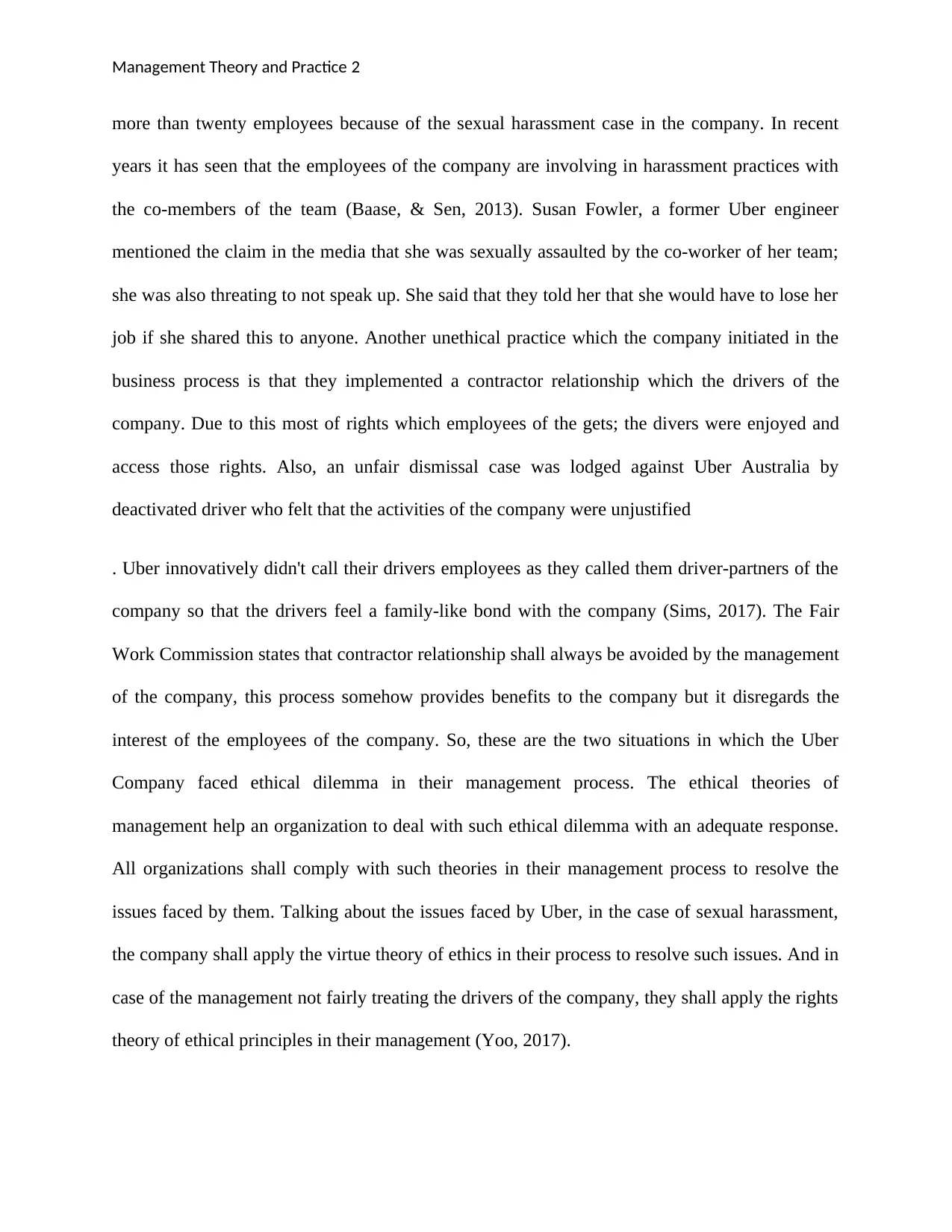
Management Theory and Practice 2
more than twenty employees because of the sexual harassment case in the company. In recent
years it has seen that the employees of the company are involving in harassment practices with
the co-members of the team (Baase, & Sen, 2013). Susan Fowler, a former Uber engineer
mentioned the claim in the media that she was sexually assaulted by the co-worker of her team;
she was also threating to not speak up. She said that they told her that she would have to lose her
job if she shared this to anyone. Another unethical practice which the company initiated in the
business process is that they implemented a contractor relationship which the drivers of the
company. Due to this most of rights which employees of the gets; the divers were enjoyed and
access those rights. Also, an unfair dismissal case was lodged against Uber Australia by
deactivated driver who felt that the activities of the company were unjustified
. Uber innovatively didn't call their drivers employees as they called them driver-partners of the
company so that the drivers feel a family-like bond with the company (Sims, 2017). The Fair
Work Commission states that contractor relationship shall always be avoided by the management
of the company, this process somehow provides benefits to the company but it disregards the
interest of the employees of the company. So, these are the two situations in which the Uber
Company faced ethical dilemma in their management process. The ethical theories of
management help an organization to deal with such ethical dilemma with an adequate response.
All organizations shall comply with such theories in their management process to resolve the
issues faced by them. Talking about the issues faced by Uber, in the case of sexual harassment,
the company shall apply the virtue theory of ethics in their process to resolve such issues. And in
case of the management not fairly treating the drivers of the company, they shall apply the rights
theory of ethical principles in their management (Yoo, 2017).
more than twenty employees because of the sexual harassment case in the company. In recent
years it has seen that the employees of the company are involving in harassment practices with
the co-members of the team (Baase, & Sen, 2013). Susan Fowler, a former Uber engineer
mentioned the claim in the media that she was sexually assaulted by the co-worker of her team;
she was also threating to not speak up. She said that they told her that she would have to lose her
job if she shared this to anyone. Another unethical practice which the company initiated in the
business process is that they implemented a contractor relationship which the drivers of the
company. Due to this most of rights which employees of the gets; the divers were enjoyed and
access those rights. Also, an unfair dismissal case was lodged against Uber Australia by
deactivated driver who felt that the activities of the company were unjustified
. Uber innovatively didn't call their drivers employees as they called them driver-partners of the
company so that the drivers feel a family-like bond with the company (Sims, 2017). The Fair
Work Commission states that contractor relationship shall always be avoided by the management
of the company, this process somehow provides benefits to the company but it disregards the
interest of the employees of the company. So, these are the two situations in which the Uber
Company faced ethical dilemma in their management process. The ethical theories of
management help an organization to deal with such ethical dilemma with an adequate response.
All organizations shall comply with such theories in their management process to resolve the
issues faced by them. Talking about the issues faced by Uber, in the case of sexual harassment,
the company shall apply the virtue theory of ethics in their process to resolve such issues. And in
case of the management not fairly treating the drivers of the company, they shall apply the rights
theory of ethical principles in their management (Yoo, 2017).
⊘ This is a preview!⊘
Do you want full access?
Subscribe today to unlock all pages.

Trusted by 1+ million students worldwide
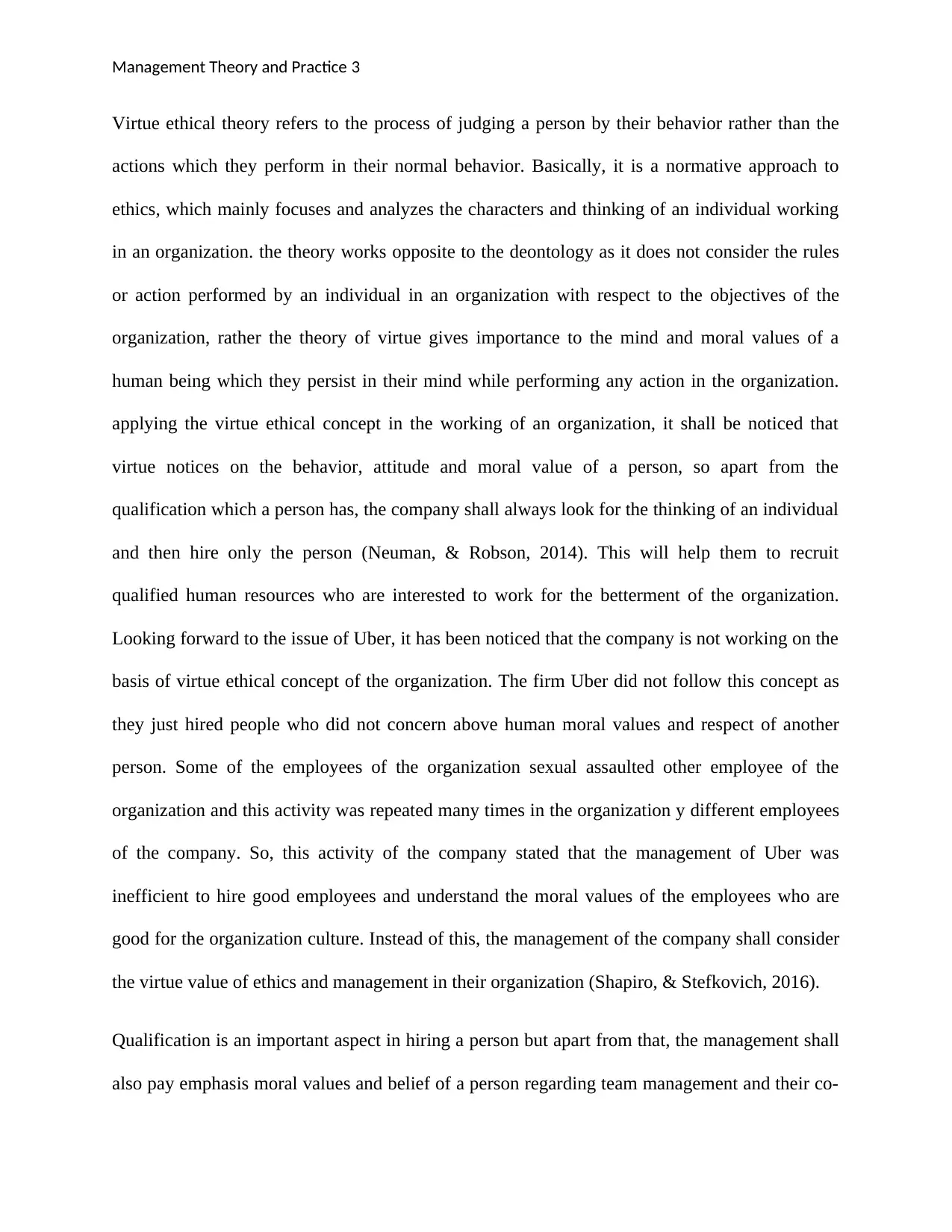
Management Theory and Practice 3
Virtue ethical theory refers to the process of judging a person by their behavior rather than the
actions which they perform in their normal behavior. Basically, it is a normative approach to
ethics, which mainly focuses and analyzes the characters and thinking of an individual working
in an organization. the theory works opposite to the deontology as it does not consider the rules
or action performed by an individual in an organization with respect to the objectives of the
organization, rather the theory of virtue gives importance to the mind and moral values of a
human being which they persist in their mind while performing any action in the organization.
applying the virtue ethical concept in the working of an organization, it shall be noticed that
virtue notices on the behavior, attitude and moral value of a person, so apart from the
qualification which a person has, the company shall always look for the thinking of an individual
and then hire only the person (Neuman, & Robson, 2014). This will help them to recruit
qualified human resources who are interested to work for the betterment of the organization.
Looking forward to the issue of Uber, it has been noticed that the company is not working on the
basis of virtue ethical concept of the organization. The firm Uber did not follow this concept as
they just hired people who did not concern above human moral values and respect of another
person. Some of the employees of the organization sexual assaulted other employee of the
organization and this activity was repeated many times in the organization y different employees
of the company. So, this activity of the company stated that the management of Uber was
inefficient to hire good employees and understand the moral values of the employees who are
good for the organization culture. Instead of this, the management of the company shall consider
the virtue value of ethics and management in their organization (Shapiro, & Stefkovich, 2016).
Qualification is an important aspect in hiring a person but apart from that, the management shall
also pay emphasis moral values and belief of a person regarding team management and their co-
Virtue ethical theory refers to the process of judging a person by their behavior rather than the
actions which they perform in their normal behavior. Basically, it is a normative approach to
ethics, which mainly focuses and analyzes the characters and thinking of an individual working
in an organization. the theory works opposite to the deontology as it does not consider the rules
or action performed by an individual in an organization with respect to the objectives of the
organization, rather the theory of virtue gives importance to the mind and moral values of a
human being which they persist in their mind while performing any action in the organization.
applying the virtue ethical concept in the working of an organization, it shall be noticed that
virtue notices on the behavior, attitude and moral value of a person, so apart from the
qualification which a person has, the company shall always look for the thinking of an individual
and then hire only the person (Neuman, & Robson, 2014). This will help them to recruit
qualified human resources who are interested to work for the betterment of the organization.
Looking forward to the issue of Uber, it has been noticed that the company is not working on the
basis of virtue ethical concept of the organization. The firm Uber did not follow this concept as
they just hired people who did not concern above human moral values and respect of another
person. Some of the employees of the organization sexual assaulted other employee of the
organization and this activity was repeated many times in the organization y different employees
of the company. So, this activity of the company stated that the management of Uber was
inefficient to hire good employees and understand the moral values of the employees who are
good for the organization culture. Instead of this, the management of the company shall consider
the virtue value of ethics and management in their organization (Shapiro, & Stefkovich, 2016).
Qualification is an important aspect in hiring a person but apart from that, the management shall
also pay emphasis moral values and belief of a person regarding team management and their co-
Paraphrase This Document
Need a fresh take? Get an instant paraphrase of this document with our AI Paraphraser
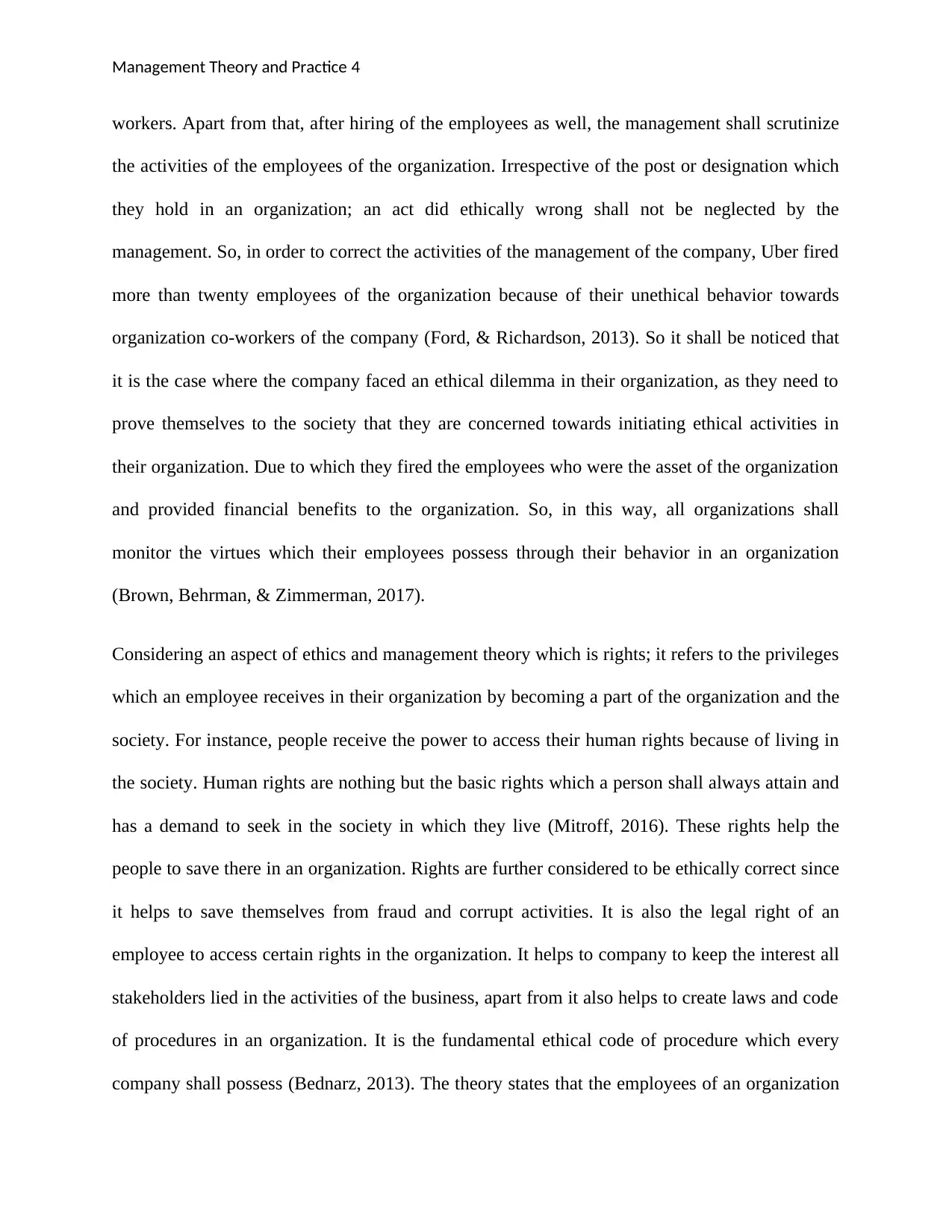
Management Theory and Practice 4
workers. Apart from that, after hiring of the employees as well, the management shall scrutinize
the activities of the employees of the organization. Irrespective of the post or designation which
they hold in an organization; an act did ethically wrong shall not be neglected by the
management. So, in order to correct the activities of the management of the company, Uber fired
more than twenty employees of the organization because of their unethical behavior towards
organization co-workers of the company (Ford, & Richardson, 2013). So it shall be noticed that
it is the case where the company faced an ethical dilemma in their organization, as they need to
prove themselves to the society that they are concerned towards initiating ethical activities in
their organization. Due to which they fired the employees who were the asset of the organization
and provided financial benefits to the organization. So, in this way, all organizations shall
monitor the virtues which their employees possess through their behavior in an organization
(Brown, Behrman, & Zimmerman, 2017).
Considering an aspect of ethics and management theory which is rights; it refers to the privileges
which an employee receives in their organization by becoming a part of the organization and the
society. For instance, people receive the power to access their human rights because of living in
the society. Human rights are nothing but the basic rights which a person shall always attain and
has a demand to seek in the society in which they live (Mitroff, 2016). These rights help the
people to save there in an organization. Rights are further considered to be ethically correct since
it helps to save themselves from fraud and corrupt activities. It is also the legal right of an
employee to access certain rights in the organization. It helps to company to keep the interest all
stakeholders lied in the activities of the business, apart from it also helps to create laws and code
of procedures in an organization. It is the fundamental ethical code of procedure which every
company shall possess (Bednarz, 2013). The theory states that the employees of an organization
workers. Apart from that, after hiring of the employees as well, the management shall scrutinize
the activities of the employees of the organization. Irrespective of the post or designation which
they hold in an organization; an act did ethically wrong shall not be neglected by the
management. So, in order to correct the activities of the management of the company, Uber fired
more than twenty employees of the organization because of their unethical behavior towards
organization co-workers of the company (Ford, & Richardson, 2013). So it shall be noticed that
it is the case where the company faced an ethical dilemma in their organization, as they need to
prove themselves to the society that they are concerned towards initiating ethical activities in
their organization. Due to which they fired the employees who were the asset of the organization
and provided financial benefits to the organization. So, in this way, all organizations shall
monitor the virtues which their employees possess through their behavior in an organization
(Brown, Behrman, & Zimmerman, 2017).
Considering an aspect of ethics and management theory which is rights; it refers to the privileges
which an employee receives in their organization by becoming a part of the organization and the
society. For instance, people receive the power to access their human rights because of living in
the society. Human rights are nothing but the basic rights which a person shall always attain and
has a demand to seek in the society in which they live (Mitroff, 2016). These rights help the
people to save there in an organization. Rights are further considered to be ethically correct since
it helps to save themselves from fraud and corrupt activities. It is also the legal right of an
employee to access certain rights in the organization. It helps to company to keep the interest all
stakeholders lied in the activities of the business, apart from it also helps to create laws and code
of procedures in an organization. It is the fundamental ethical code of procedure which every
company shall possess (Bednarz, 2013). The theory states that the employees of an organization
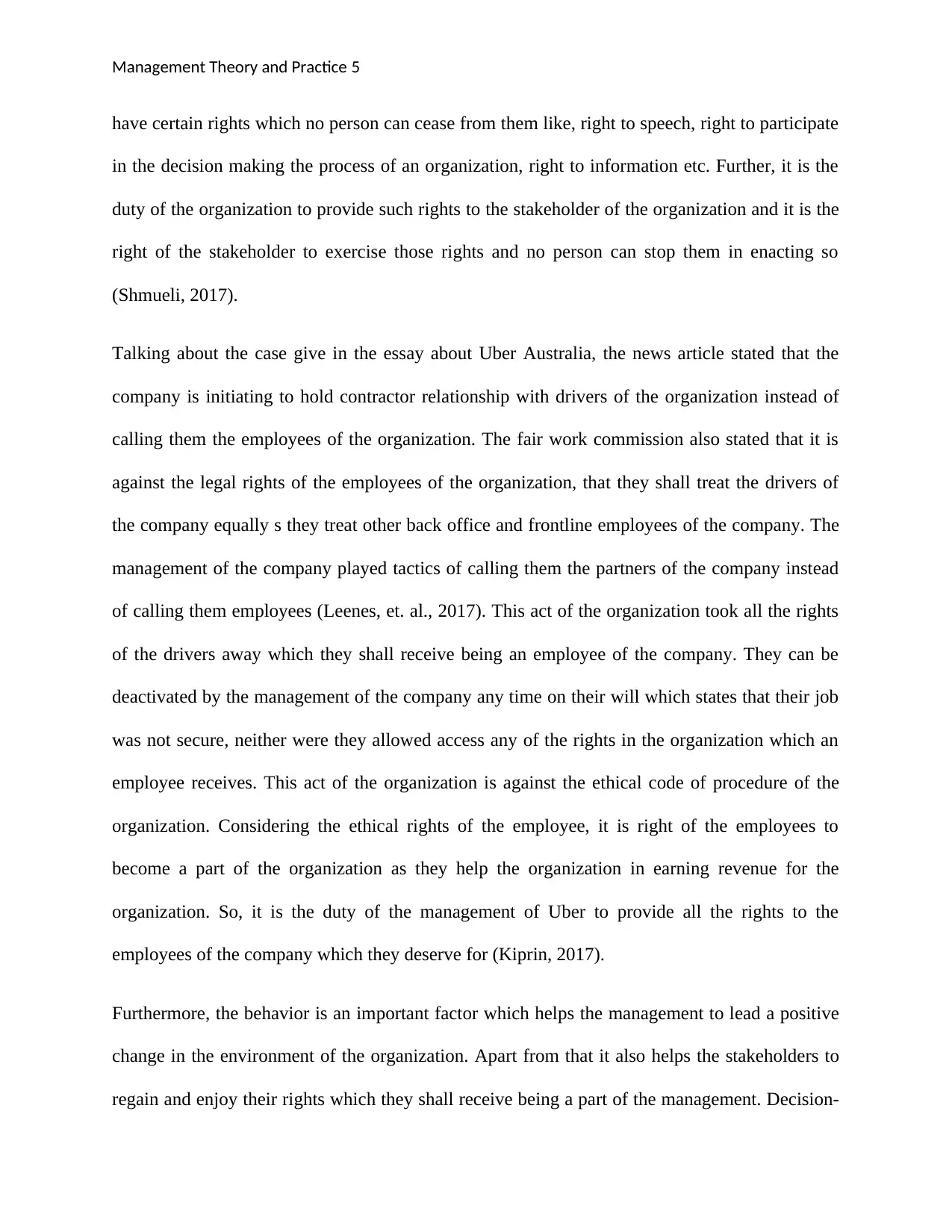
Management Theory and Practice 5
have certain rights which no person can cease from them like, right to speech, right to participate
in the decision making the process of an organization, right to information etc. Further, it is the
duty of the organization to provide such rights to the stakeholder of the organization and it is the
right of the stakeholder to exercise those rights and no person can stop them in enacting so
(Shmueli, 2017).
Talking about the case give in the essay about Uber Australia, the news article stated that the
company is initiating to hold contractor relationship with drivers of the organization instead of
calling them the employees of the organization. The fair work commission also stated that it is
against the legal rights of the employees of the organization, that they shall treat the drivers of
the company equally s they treat other back office and frontline employees of the company. The
management of the company played tactics of calling them the partners of the company instead
of calling them employees (Leenes, et. al., 2017). This act of the organization took all the rights
of the drivers away which they shall receive being an employee of the company. They can be
deactivated by the management of the company any time on their will which states that their job
was not secure, neither were they allowed access any of the rights in the organization which an
employee receives. This act of the organization is against the ethical code of procedure of the
organization. Considering the ethical rights of the employee, it is right of the employees to
become a part of the organization as they help the organization in earning revenue for the
organization. So, it is the duty of the management of Uber to provide all the rights to the
employees of the company which they deserve for (Kiprin, 2017).
Furthermore, the behavior is an important factor which helps the management to lead a positive
change in the environment of the organization. Apart from that it also helps the stakeholders to
regain and enjoy their rights which they shall receive being a part of the management. Decision-
have certain rights which no person can cease from them like, right to speech, right to participate
in the decision making the process of an organization, right to information etc. Further, it is the
duty of the organization to provide such rights to the stakeholder of the organization and it is the
right of the stakeholder to exercise those rights and no person can stop them in enacting so
(Shmueli, 2017).
Talking about the case give in the essay about Uber Australia, the news article stated that the
company is initiating to hold contractor relationship with drivers of the organization instead of
calling them the employees of the organization. The fair work commission also stated that it is
against the legal rights of the employees of the organization, that they shall treat the drivers of
the company equally s they treat other back office and frontline employees of the company. The
management of the company played tactics of calling them the partners of the company instead
of calling them employees (Leenes, et. al., 2017). This act of the organization took all the rights
of the drivers away which they shall receive being an employee of the company. They can be
deactivated by the management of the company any time on their will which states that their job
was not secure, neither were they allowed access any of the rights in the organization which an
employee receives. This act of the organization is against the ethical code of procedure of the
organization. Considering the ethical rights of the employee, it is right of the employees to
become a part of the organization as they help the organization in earning revenue for the
organization. So, it is the duty of the management of Uber to provide all the rights to the
employees of the company which they deserve for (Kiprin, 2017).
Furthermore, the behavior is an important factor which helps the management to lead a positive
change in the environment of the organization. Apart from that it also helps the stakeholders to
regain and enjoy their rights which they shall receive being a part of the management. Decision-
⊘ This is a preview!⊘
Do you want full access?
Subscribe today to unlock all pages.

Trusted by 1+ million students worldwide
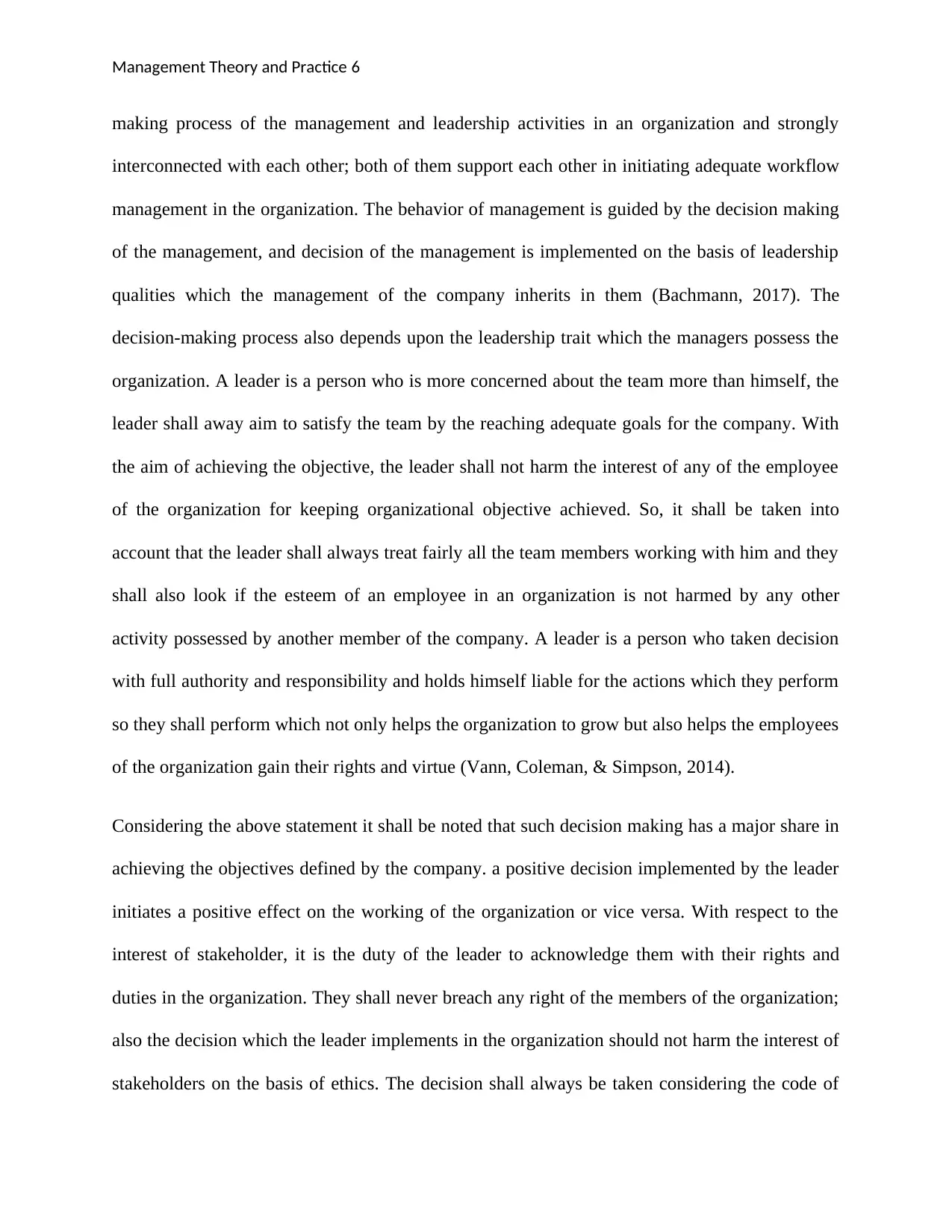
Management Theory and Practice 6
making process of the management and leadership activities in an organization and strongly
interconnected with each other; both of them support each other in initiating adequate workflow
management in the organization. The behavior of management is guided by the decision making
of the management, and decision of the management is implemented on the basis of leadership
qualities which the management of the company inherits in them (Bachmann, 2017). The
decision-making process also depends upon the leadership trait which the managers possess the
organization. A leader is a person who is more concerned about the team more than himself, the
leader shall away aim to satisfy the team by the reaching adequate goals for the company. With
the aim of achieving the objective, the leader shall not harm the interest of any of the employee
of the organization for keeping organizational objective achieved. So, it shall be taken into
account that the leader shall always treat fairly all the team members working with him and they
shall also look if the esteem of an employee in an organization is not harmed by any other
activity possessed by another member of the company. A leader is a person who taken decision
with full authority and responsibility and holds himself liable for the actions which they perform
so they shall perform which not only helps the organization to grow but also helps the employees
of the organization gain their rights and virtue (Vann, Coleman, & Simpson, 2014).
Considering the above statement it shall be noted that such decision making has a major share in
achieving the objectives defined by the company. a positive decision implemented by the leader
initiates a positive effect on the working of the organization or vice versa. With respect to the
interest of stakeholder, it is the duty of the leader to acknowledge them with their rights and
duties in the organization. They shall never breach any right of the members of the organization;
also the decision which the leader implements in the organization should not harm the interest of
stakeholders on the basis of ethics. The decision shall always be taken considering the code of
making process of the management and leadership activities in an organization and strongly
interconnected with each other; both of them support each other in initiating adequate workflow
management in the organization. The behavior of management is guided by the decision making
of the management, and decision of the management is implemented on the basis of leadership
qualities which the management of the company inherits in them (Bachmann, 2017). The
decision-making process also depends upon the leadership trait which the managers possess the
organization. A leader is a person who is more concerned about the team more than himself, the
leader shall away aim to satisfy the team by the reaching adequate goals for the company. With
the aim of achieving the objective, the leader shall not harm the interest of any of the employee
of the organization for keeping organizational objective achieved. So, it shall be taken into
account that the leader shall always treat fairly all the team members working with him and they
shall also look if the esteem of an employee in an organization is not harmed by any other
activity possessed by another member of the company. A leader is a person who taken decision
with full authority and responsibility and holds himself liable for the actions which they perform
so they shall perform which not only helps the organization to grow but also helps the employees
of the organization gain their rights and virtue (Vann, Coleman, & Simpson, 2014).
Considering the above statement it shall be noted that such decision making has a major share in
achieving the objectives defined by the company. a positive decision implemented by the leader
initiates a positive effect on the working of the organization or vice versa. With respect to the
interest of stakeholder, it is the duty of the leader to acknowledge them with their rights and
duties in the organization. They shall never breach any right of the members of the organization;
also the decision which the leader implements in the organization should not harm the interest of
stakeholders on the basis of ethics. The decision shall always be taken considering the code of
Paraphrase This Document
Need a fresh take? Get an instant paraphrase of this document with our AI Paraphraser
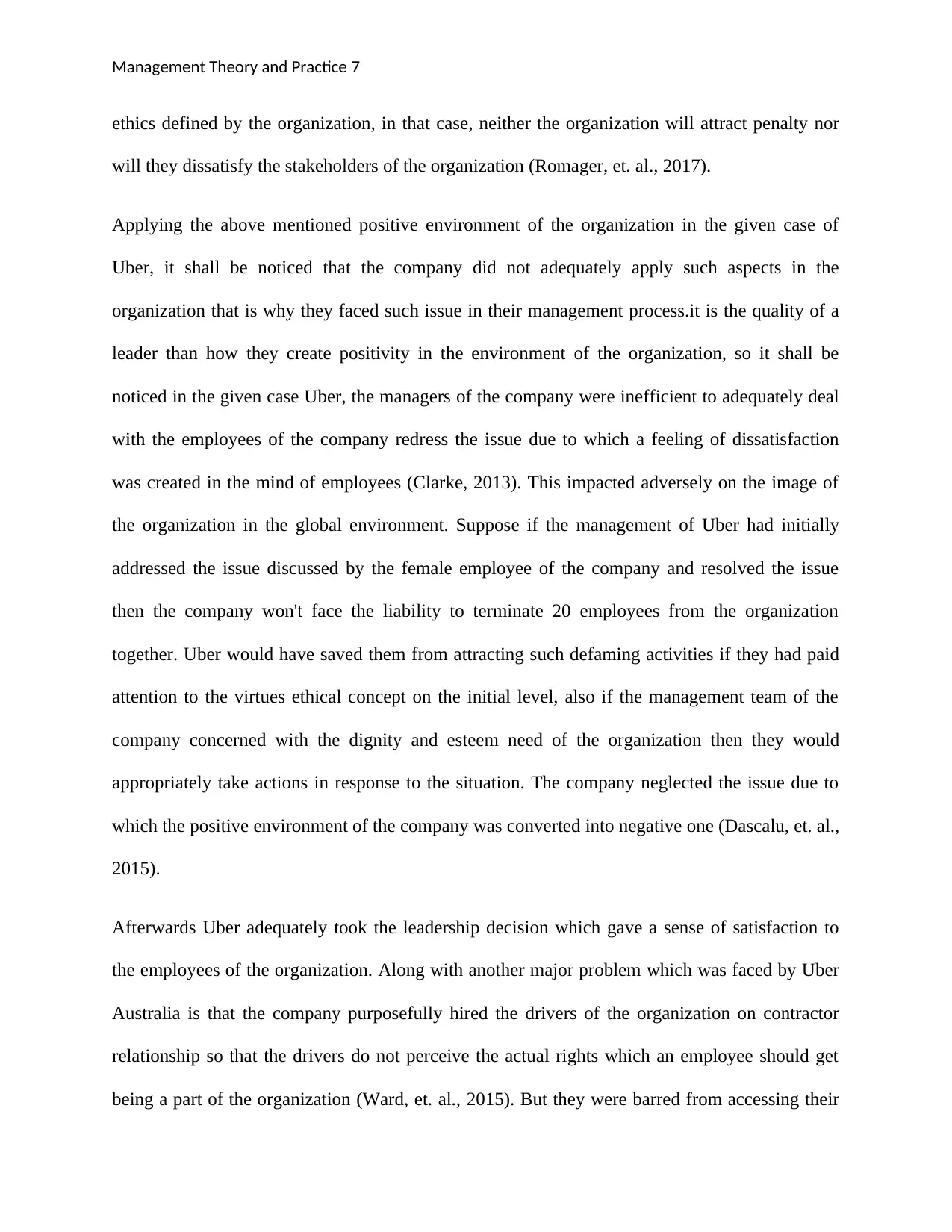
Management Theory and Practice 7
ethics defined by the organization, in that case, neither the organization will attract penalty nor
will they dissatisfy the stakeholders of the organization (Romager, et. al., 2017).
Applying the above mentioned positive environment of the organization in the given case of
Uber, it shall be noticed that the company did not adequately apply such aspects in the
organization that is why they faced such issue in their management process.it is the quality of a
leader than how they create positivity in the environment of the organization, so it shall be
noticed in the given case Uber, the managers of the company were inefficient to adequately deal
with the employees of the company redress the issue due to which a feeling of dissatisfaction
was created in the mind of employees (Clarke, 2013). This impacted adversely on the image of
the organization in the global environment. Suppose if the management of Uber had initially
addressed the issue discussed by the female employee of the company and resolved the issue
then the company won't face the liability to terminate 20 employees from the organization
together. Uber would have saved them from attracting such defaming activities if they had paid
attention to the virtues ethical concept on the initial level, also if the management team of the
company concerned with the dignity and esteem need of the organization then they would
appropriately take actions in response to the situation. The company neglected the issue due to
which the positive environment of the company was converted into negative one (Dascalu, et. al.,
2015).
Afterwards Uber adequately took the leadership decision which gave a sense of satisfaction to
the employees of the organization. Along with another major problem which was faced by Uber
Australia is that the company purposefully hired the drivers of the organization on contractor
relationship so that the drivers do not perceive the actual rights which an employee should get
being a part of the organization (Ward, et. al., 2015). But they were barred from accessing their
ethics defined by the organization, in that case, neither the organization will attract penalty nor
will they dissatisfy the stakeholders of the organization (Romager, et. al., 2017).
Applying the above mentioned positive environment of the organization in the given case of
Uber, it shall be noticed that the company did not adequately apply such aspects in the
organization that is why they faced such issue in their management process.it is the quality of a
leader than how they create positivity in the environment of the organization, so it shall be
noticed in the given case Uber, the managers of the company were inefficient to adequately deal
with the employees of the company redress the issue due to which a feeling of dissatisfaction
was created in the mind of employees (Clarke, 2013). This impacted adversely on the image of
the organization in the global environment. Suppose if the management of Uber had initially
addressed the issue discussed by the female employee of the company and resolved the issue
then the company won't face the liability to terminate 20 employees from the organization
together. Uber would have saved them from attracting such defaming activities if they had paid
attention to the virtues ethical concept on the initial level, also if the management team of the
company concerned with the dignity and esteem need of the organization then they would
appropriately take actions in response to the situation. The company neglected the issue due to
which the positive environment of the company was converted into negative one (Dascalu, et. al.,
2015).
Afterwards Uber adequately took the leadership decision which gave a sense of satisfaction to
the employees of the organization. Along with another major problem which was faced by Uber
Australia is that the company purposefully hired the drivers of the organization on contractor
relationship so that the drivers do not perceive the actual rights which an employee should get
being a part of the organization (Ward, et. al., 2015). But they were barred from accessing their
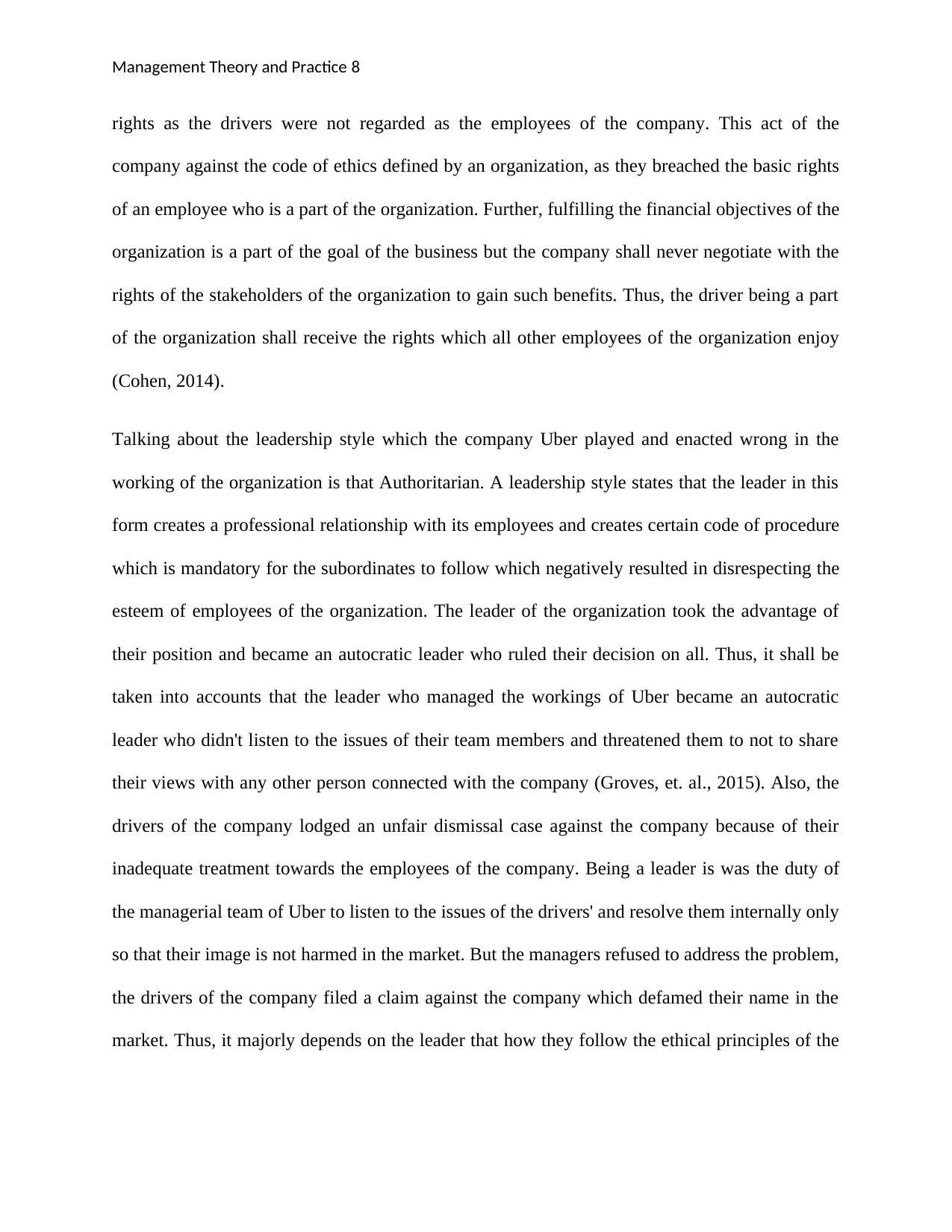
Management Theory and Practice 8
rights as the drivers were not regarded as the employees of the company. This act of the
company against the code of ethics defined by an organization, as they breached the basic rights
of an employee who is a part of the organization. Further, fulfilling the financial objectives of the
organization is a part of the goal of the business but the company shall never negotiate with the
rights of the stakeholders of the organization to gain such benefits. Thus, the driver being a part
of the organization shall receive the rights which all other employees of the organization enjoy
(Cohen, 2014).
Talking about the leadership style which the company Uber played and enacted wrong in the
working of the organization is that Authoritarian. A leadership style states that the leader in this
form creates a professional relationship with its employees and creates certain code of procedure
which is mandatory for the subordinates to follow which negatively resulted in disrespecting the
esteem of employees of the organization. The leader of the organization took the advantage of
their position and became an autocratic leader who ruled their decision on all. Thus, it shall be
taken into accounts that the leader who managed the workings of Uber became an autocratic
leader who didn't listen to the issues of their team members and threatened them to not to share
their views with any other person connected with the company (Groves, et. al., 2015). Also, the
drivers of the company lodged an unfair dismissal case against the company because of their
inadequate treatment towards the employees of the company. Being a leader is was the duty of
the managerial team of Uber to listen to the issues of the drivers' and resolve them internally only
so that their image is not harmed in the market. But the managers refused to address the problem,
the drivers of the company filed a claim against the company which defamed their name in the
market. Thus, it majorly depends on the leader that how they follow the ethical principles of the
rights as the drivers were not regarded as the employees of the company. This act of the
company against the code of ethics defined by an organization, as they breached the basic rights
of an employee who is a part of the organization. Further, fulfilling the financial objectives of the
organization is a part of the goal of the business but the company shall never negotiate with the
rights of the stakeholders of the organization to gain such benefits. Thus, the driver being a part
of the organization shall receive the rights which all other employees of the organization enjoy
(Cohen, 2014).
Talking about the leadership style which the company Uber played and enacted wrong in the
working of the organization is that Authoritarian. A leadership style states that the leader in this
form creates a professional relationship with its employees and creates certain code of procedure
which is mandatory for the subordinates to follow which negatively resulted in disrespecting the
esteem of employees of the organization. The leader of the organization took the advantage of
their position and became an autocratic leader who ruled their decision on all. Thus, it shall be
taken into accounts that the leader who managed the workings of Uber became an autocratic
leader who didn't listen to the issues of their team members and threatened them to not to share
their views with any other person connected with the company (Groves, et. al., 2015). Also, the
drivers of the company lodged an unfair dismissal case against the company because of their
inadequate treatment towards the employees of the company. Being a leader is was the duty of
the managerial team of Uber to listen to the issues of the drivers' and resolve them internally only
so that their image is not harmed in the market. But the managers refused to address the problem,
the drivers of the company filed a claim against the company which defamed their name in the
market. Thus, it majorly depends on the leader that how they follow the ethical principles of the
⊘ This is a preview!⊘
Do you want full access?
Subscribe today to unlock all pages.

Trusted by 1+ million students worldwide
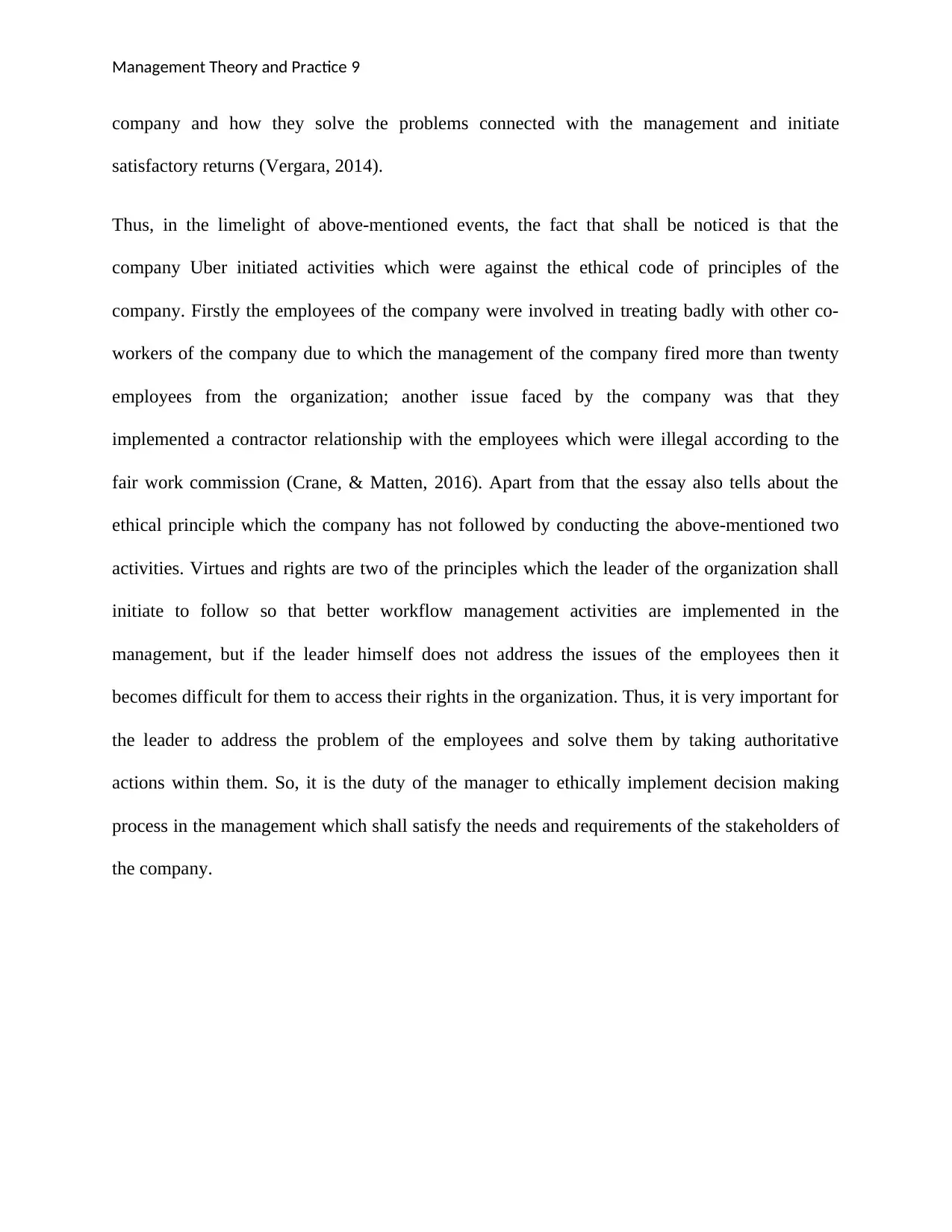
Management Theory and Practice 9
company and how they solve the problems connected with the management and initiate
satisfactory returns (Vergara, 2014).
Thus, in the limelight of above-mentioned events, the fact that shall be noticed is that the
company Uber initiated activities which were against the ethical code of principles of the
company. Firstly the employees of the company were involved in treating badly with other co-
workers of the company due to which the management of the company fired more than twenty
employees from the organization; another issue faced by the company was that they
implemented a contractor relationship with the employees which were illegal according to the
fair work commission (Crane, & Matten, 2016). Apart from that the essay also tells about the
ethical principle which the company has not followed by conducting the above-mentioned two
activities. Virtues and rights are two of the principles which the leader of the organization shall
initiate to follow so that better workflow management activities are implemented in the
management, but if the leader himself does not address the issues of the employees then it
becomes difficult for them to access their rights in the organization. Thus, it is very important for
the leader to address the problem of the employees and solve them by taking authoritative
actions within them. So, it is the duty of the manager to ethically implement decision making
process in the management which shall satisfy the needs and requirements of the stakeholders of
the company.
company and how they solve the problems connected with the management and initiate
satisfactory returns (Vergara, 2014).
Thus, in the limelight of above-mentioned events, the fact that shall be noticed is that the
company Uber initiated activities which were against the ethical code of principles of the
company. Firstly the employees of the company were involved in treating badly with other co-
workers of the company due to which the management of the company fired more than twenty
employees from the organization; another issue faced by the company was that they
implemented a contractor relationship with the employees which were illegal according to the
fair work commission (Crane, & Matten, 2016). Apart from that the essay also tells about the
ethical principle which the company has not followed by conducting the above-mentioned two
activities. Virtues and rights are two of the principles which the leader of the organization shall
initiate to follow so that better workflow management activities are implemented in the
management, but if the leader himself does not address the issues of the employees then it
becomes difficult for them to access their rights in the organization. Thus, it is very important for
the leader to address the problem of the employees and solve them by taking authoritative
actions within them. So, it is the duty of the manager to ethically implement decision making
process in the management which shall satisfy the needs and requirements of the stakeholders of
the company.
Paraphrase This Document
Need a fresh take? Get an instant paraphrase of this document with our AI Paraphraser
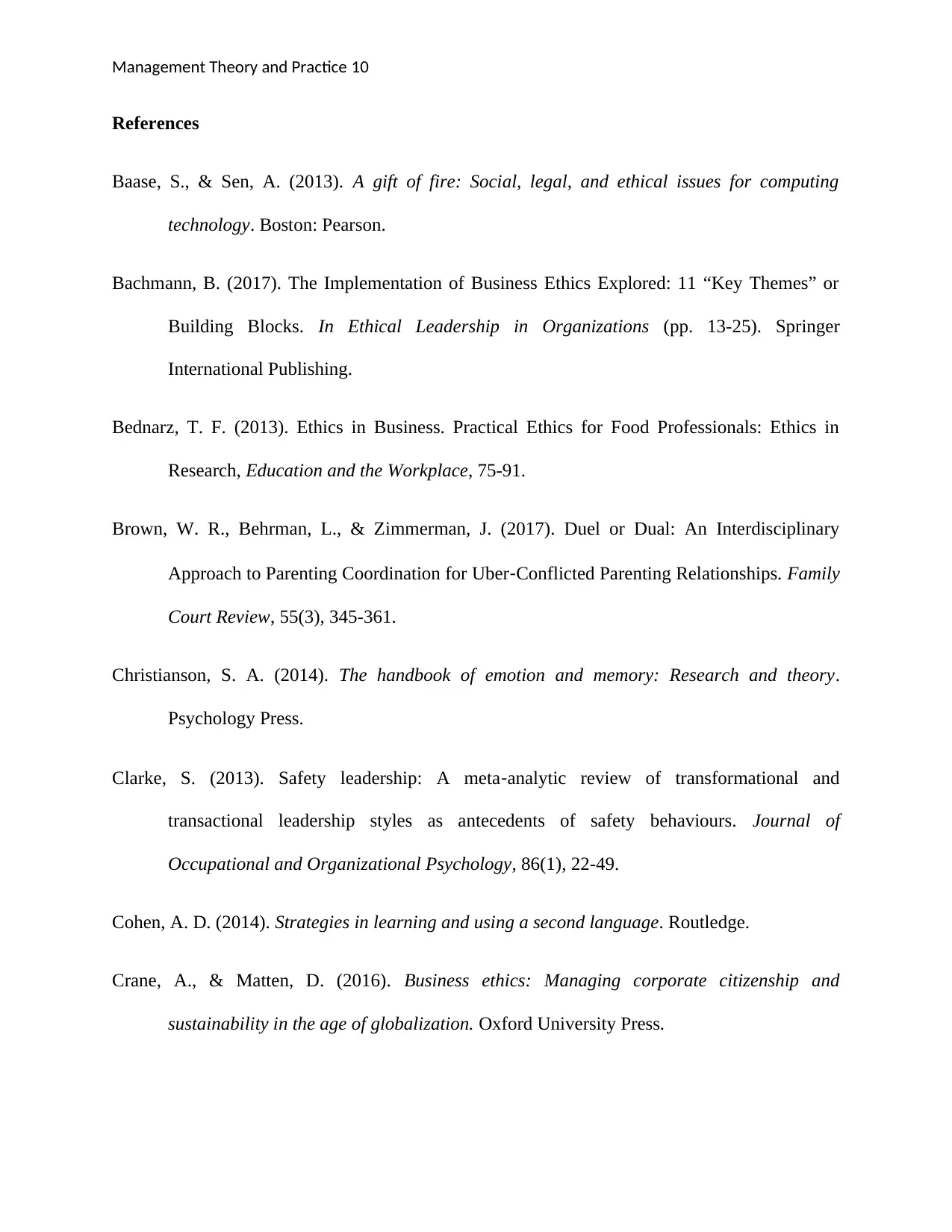
Management Theory and Practice 10
References
Baase, S., & Sen, A. (2013). A gift of fire: Social, legal, and ethical issues for computing
technology. Boston: Pearson.
Bachmann, B. (2017). The Implementation of Business Ethics Explored: 11 “Key Themes” or
Building Blocks. In Ethical Leadership in Organizations (pp. 13-25). Springer
International Publishing.
Bednarz, T. F. (2013). Ethics in Business. Practical Ethics for Food Professionals: Ethics in
Research, Education and the Workplace, 75-91.
Brown, W. R., Behrman, L., & Zimmerman, J. (2017). Duel or Dual: An Interdisciplinary
Approach to Parenting Coordination for Uber‐Conflicted Parenting Relationships. Family
Court Review, 55(3), 345-361.
Christianson, S. A. (2014). The handbook of emotion and memory: Research and theory.
Psychology Press.
Clarke, S. (2013). Safety leadership: A meta‐analytic review of transformational and
transactional leadership styles as antecedents of safety behaviours. Journal of
Occupational and Organizational Psychology, 86(1), 22-49.
Cohen, A. D. (2014). Strategies in learning and using a second language. Routledge.
Crane, A., & Matten, D. (2016). Business ethics: Managing corporate citizenship and
sustainability in the age of globalization. Oxford University Press.
References
Baase, S., & Sen, A. (2013). A gift of fire: Social, legal, and ethical issues for computing
technology. Boston: Pearson.
Bachmann, B. (2017). The Implementation of Business Ethics Explored: 11 “Key Themes” or
Building Blocks. In Ethical Leadership in Organizations (pp. 13-25). Springer
International Publishing.
Bednarz, T. F. (2013). Ethics in Business. Practical Ethics for Food Professionals: Ethics in
Research, Education and the Workplace, 75-91.
Brown, W. R., Behrman, L., & Zimmerman, J. (2017). Duel or Dual: An Interdisciplinary
Approach to Parenting Coordination for Uber‐Conflicted Parenting Relationships. Family
Court Review, 55(3), 345-361.
Christianson, S. A. (2014). The handbook of emotion and memory: Research and theory.
Psychology Press.
Clarke, S. (2013). Safety leadership: A meta‐analytic review of transformational and
transactional leadership styles as antecedents of safety behaviours. Journal of
Occupational and Organizational Psychology, 86(1), 22-49.
Cohen, A. D. (2014). Strategies in learning and using a second language. Routledge.
Crane, A., & Matten, D. (2016). Business ethics: Managing corporate citizenship and
sustainability in the age of globalization. Oxford University Press.
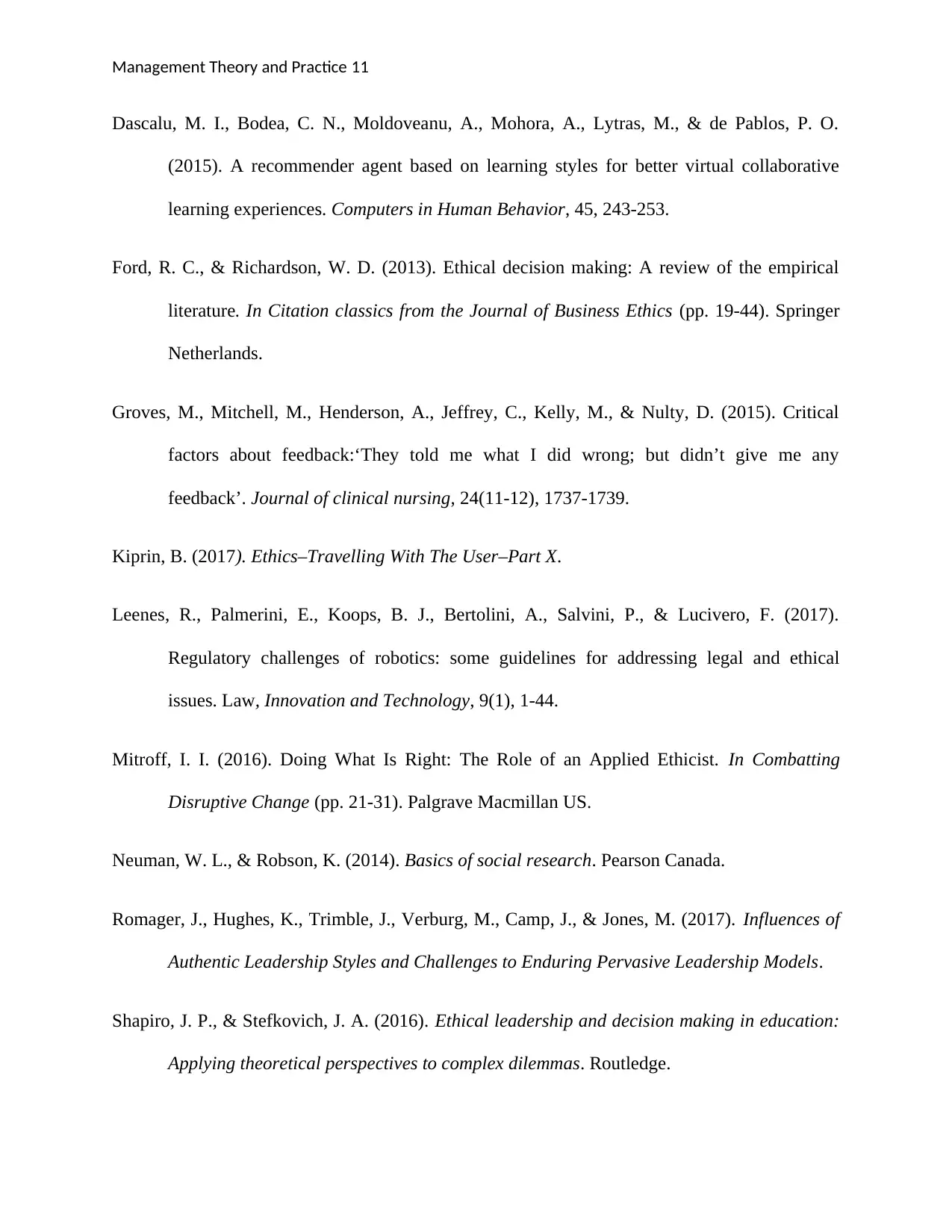
Management Theory and Practice 11
Dascalu, M. I., Bodea, C. N., Moldoveanu, A., Mohora, A., Lytras, M., & de Pablos, P. O.
(2015). A recommender agent based on learning styles for better virtual collaborative
learning experiences. Computers in Human Behavior, 45, 243-253.
Ford, R. C., & Richardson, W. D. (2013). Ethical decision making: A review of the empirical
literature. In Citation classics from the Journal of Business Ethics (pp. 19-44). Springer
Netherlands.
Groves, M., Mitchell, M., Henderson, A., Jeffrey, C., Kelly, M., & Nulty, D. (2015). Critical
factors about feedback:‘They told me what I did wrong; but didn’t give me any
feedback’. Journal of clinical nursing, 24(11-12), 1737-1739.
Kiprin, B. (2017). Ethics–Travelling With The User–Part X.
Leenes, R., Palmerini, E., Koops, B. J., Bertolini, A., Salvini, P., & Lucivero, F. (2017).
Regulatory challenges of robotics: some guidelines for addressing legal and ethical
issues. Law, Innovation and Technology, 9(1), 1-44.
Mitroff, I. I. (2016). Doing What Is Right: The Role of an Applied Ethicist. In Combatting
Disruptive Change (pp. 21-31). Palgrave Macmillan US.
Neuman, W. L., & Robson, K. (2014). Basics of social research. Pearson Canada.
Romager, J., Hughes, K., Trimble, J., Verburg, M., Camp, J., & Jones, M. (2017). Influences of
Authentic Leadership Styles and Challenges to Enduring Pervasive Leadership Models.
Shapiro, J. P., & Stefkovich, J. A. (2016). Ethical leadership and decision making in education:
Applying theoretical perspectives to complex dilemmas. Routledge.
Dascalu, M. I., Bodea, C. N., Moldoveanu, A., Mohora, A., Lytras, M., & de Pablos, P. O.
(2015). A recommender agent based on learning styles for better virtual collaborative
learning experiences. Computers in Human Behavior, 45, 243-253.
Ford, R. C., & Richardson, W. D. (2013). Ethical decision making: A review of the empirical
literature. In Citation classics from the Journal of Business Ethics (pp. 19-44). Springer
Netherlands.
Groves, M., Mitchell, M., Henderson, A., Jeffrey, C., Kelly, M., & Nulty, D. (2015). Critical
factors about feedback:‘They told me what I did wrong; but didn’t give me any
feedback’. Journal of clinical nursing, 24(11-12), 1737-1739.
Kiprin, B. (2017). Ethics–Travelling With The User–Part X.
Leenes, R., Palmerini, E., Koops, B. J., Bertolini, A., Salvini, P., & Lucivero, F. (2017).
Regulatory challenges of robotics: some guidelines for addressing legal and ethical
issues. Law, Innovation and Technology, 9(1), 1-44.
Mitroff, I. I. (2016). Doing What Is Right: The Role of an Applied Ethicist. In Combatting
Disruptive Change (pp. 21-31). Palgrave Macmillan US.
Neuman, W. L., & Robson, K. (2014). Basics of social research. Pearson Canada.
Romager, J., Hughes, K., Trimble, J., Verburg, M., Camp, J., & Jones, M. (2017). Influences of
Authentic Leadership Styles and Challenges to Enduring Pervasive Leadership Models.
Shapiro, J. P., & Stefkovich, J. A. (2016). Ethical leadership and decision making in education:
Applying theoretical perspectives to complex dilemmas. Routledge.
⊘ This is a preview!⊘
Do you want full access?
Subscribe today to unlock all pages.

Trusted by 1+ million students worldwide
1 out of 13
Related Documents
Your All-in-One AI-Powered Toolkit for Academic Success.
+13062052269
info@desklib.com
Available 24*7 on WhatsApp / Email
![[object Object]](/_next/static/media/star-bottom.7253800d.svg)
Unlock your academic potential
Copyright © 2020–2026 A2Z Services. All Rights Reserved. Developed and managed by ZUCOL.





